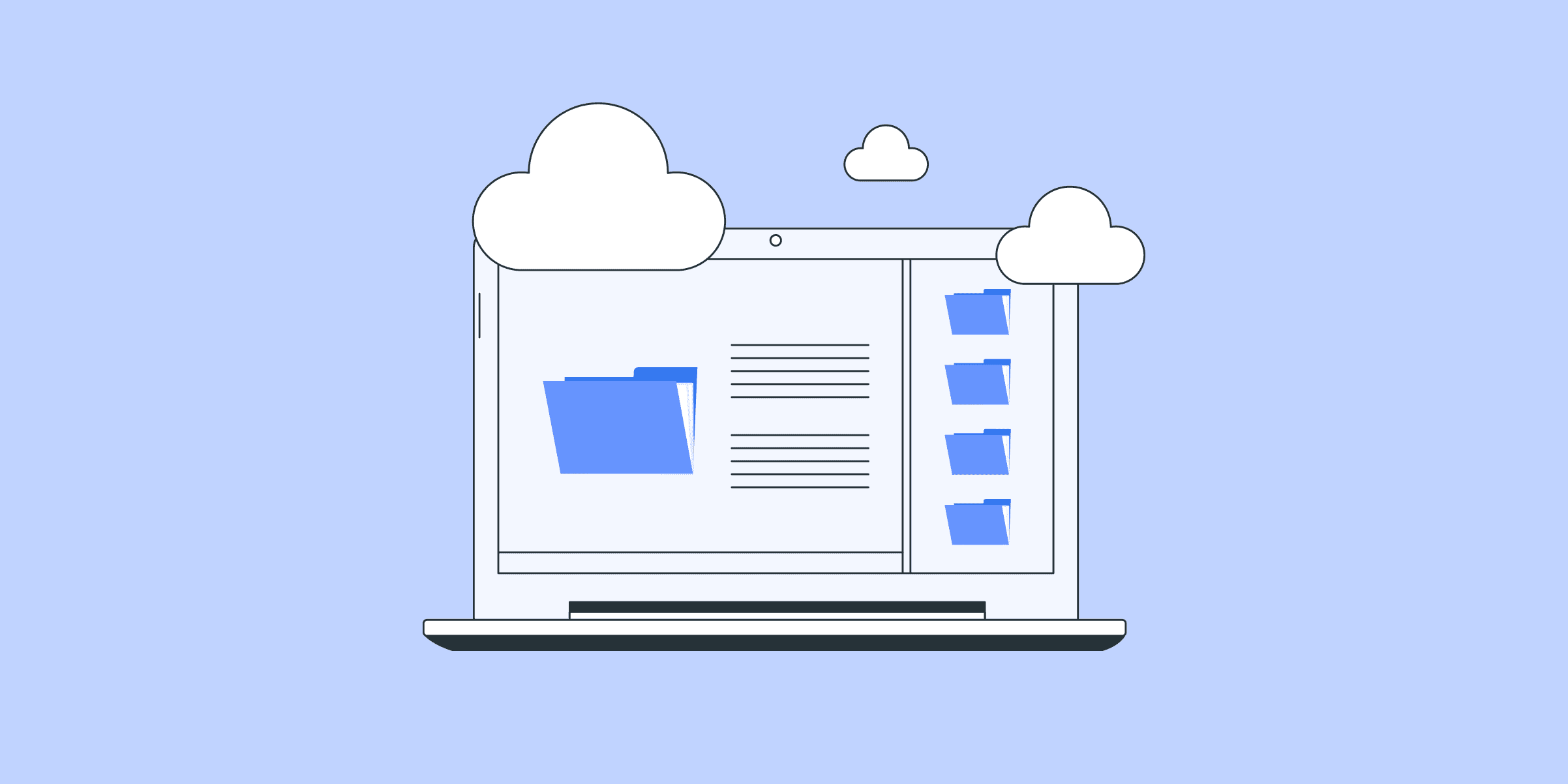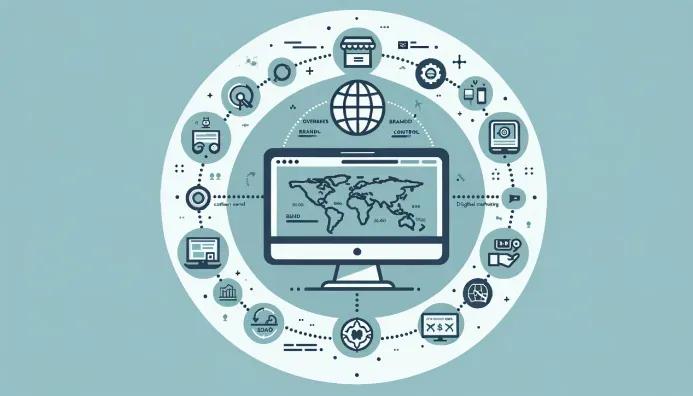住宅代理

Customized for Success: Enterprise Proxy Solutions Tailored for Big Businesses
In today's digital landscape, where data security, privacy, and efficient online operations are paramount for businesses, the role of enterprise proxy solutions cannot be overstated. These solutions are designed specifically to meet the unique needs and challenges faced by large corporations and organizations operating on a global scale. From ensuring data privacy and security to optimizing network performance and facilitating regulatory compliance, enterprise proxy solutions play a crucial role in the success of big businesses.Understanding Enterprise Proxy SolutionsEnterprise proxy solutions are sophisticated tools that act as intermediaries between a company's internal network and the internet. They intercept requests from users within the organization and forward them to the internet, masking the users' IP addresses and providing anonymity and security. These proxies can be customized and configured to meet the specific requirements of large enterprises, including handling high volumes of traffic, supporting diverse protocols, and implementing advanced security measures.Tailoring Proxies for Big Business Needs1. Data Security and Privacy: Enterprise proxy solutions offer robust encryption protocols and secure tunneling mechanisms to protect sensitive data transmitted over the network. They help mitigate the risk of data breaches and unauthorized access by acting as a barrier between internal systems and external threats.2. Network Performance Optimization: Proxies can cache frequently accessed content, reducing bandwidth usage and accelerating content delivery. This optimization is crucial for large businesses with high traffic volumes and global operations, ensuring fast and reliable access to online resources.3. Regulatory Compliance: Many industries have strict regulatory requirements regarding data protection and privacy. Enterprise proxy solutions can enforce compliance by implementing access controls, logging user activities, and providing audit trails for regulatory reporting.4. Content Filtering and Access Control: Enterprises often need to control access to certain websites or applications for security or productivity reasons. Proxies can enforce content filtering policies, block malicious websites, and restrict access based on user roles and permissions.5. Load Balancing and Redundancy: To ensure high availability and reliability, enterprise proxies can distribute traffic across multiple servers, balancing the load and providing failover capabilities. This redundancy is critical for business continuity and uninterrupted operations.Customizing proxy configurations is vital for modern businesses seeking to enhance security and performance.By aligning proxy settings with specific business goals, companies can unlock several key benefits:1. Enhanced Security: Custom proxy configurations bolster data protection and prevent unauthorized access.2. Improved Performance: Optimized proxy settings enhance network speed and efficiency, ensuring faster access to online resources.3. Regulatory Compliance: Tailored proxy configurations help meet industry regulations through audit trails and content filtering.4. Access Control: Proxy solutions enable businesses to manage access policies for websites and applications.5. Scalability: Easily scale proxy infrastructure to accommodate growing business needs.Customizing proxy configurations is crucial for businesses aiming to enhance security, improve performance, ensure compliance, manage access, and scale infrastructure effectively.ConclusionEnterprise proxy solutions are indispensable tools for big businesses looking to secure their data, optimize network performance, and ensure regulatory compliance. By tailoring proxies to meet specific business needs, organizations can enhance security, improve efficiency, and achieve seamless online operations in today's digital age. Embracing enterprise proxy solutions is not just a strategic choice but a necessity for staying competitive and resilient in a rapidly evolving business environment.

Leveraging Proxies in Financial Services: Revolutionizing Banking and Finance
In the fast-paced and ever-evolving world of financial services, the role of technology has become increasingly crucial. One such technology that has gained significant traction is the use of proxies, which are proving to be a game-changer in banking and finance. This article delves into the applications of proxies in the financial sector, exploring how they are revolutionizing processes and enhancing security.The Evolution of Proxies in Financial ServicesTraditionally, proxies were primarily associated with anonymity and bypassing internet restrictions. However, their utility has expanded far beyond that, especially in the highly regulated and sensitive domain of financial services. Proxies now play a multifaceted role, offering a range of benefits and applications that are reshaping the landscape of banking and finance.Enhanced Security and PrivacyOne of the primary reasons financial institutions are embracing proxies is for enhanced security and privacy. Proxies act as intermediaries between users and the internet, masking their IP addresses and encrypting data transmissions. This adds an extra layer of security, protecting sensitive financial information from unauthorized access and cyber threats. With the rise of online banking and digital transactions, maintaining robust security measures is paramount, making proxies an indispensable tool for financial services.Improved Compliance and Risk ManagementCompliance with regulatory requirements is a cornerstone of the financial industry. Proxies assist in meeting these stringent regulations by providing features such as access controls, audit trails, and content filtering. They enable financial institutions to monitor and control internet usage, ensuring compliance with laws and regulations governing data protection, financial transactions, and customer privacy. Additionally, proxies aid in risk management by identifying and mitigating potential cybersecurity risks and vulnerabilities.Accelerated Data Analysis and Market ResearchIn the competitive landscape of banking and finance, data analysis and market research play a pivotal role in decision-making. Proxies facilitate faster and more efficient data collection by allowing access to geographically restricted information and anonymizing web scraping activities. This enables financial firms to gather valuable insights, track market trends, and make informed investment decisions. Proxies also support high-frequency trading strategies by reducing latency and improving connectivity to financial markets.Enhanced Customer ExperienceThe use of proxies in financial services extends to enhancing the customer experience. By leveraging proxies, banks and financial institutions can optimize website performance, deliver personalized content, and ensure seamless access to online services across geographically dispersed locations. Proxies also enable the implementation of content delivery networks (CDNs), resulting in faster loading times for web pages and applications, thereby improving overall user satisfaction.Leveraging Proxies for Fraud PreventionFinancial fraud is a significant concern for banks and financial institutions. Proxies play a vital role in fraud prevention by detecting and blocking suspicious activities, such as fraudulent transactions, phishing attempts, and account takeovers. They enable real-time monitoring of user behavior, flagging anomalous patterns and unauthorized access attempts. This proactive approach to fraud detection helps safeguard customer assets and maintains trust in financial services.The Future of Proxies in Financial ServicesAs technology continues to advance, the future of proxies in financial services looks promising. Innovations such as AI-driven proxies, blockchain-based proxy networks, and decentralized finance (DeFi) platforms are poised to further enhance security, efficiency, and transparency in banking and finance. With continued emphasis on cybersecurity, regulatory compliance, and customer-centric solutions, proxies will remain a vital component of the modern financial ecosystem.In conclusion, proxies have evolved from simple tools for internet browsing to sophisticated solutions with diverse applications in banking and finance. From bolstering security and compliance to enabling data analysis and enhancing customer experiences, proxies are driving innovation and efficiency in the financial sector. Embracing the potential of proxies can position financial institutions for success in an increasingly digital and competitive landscape.

Harnessing the Power of Proxies in Journalism: Streamlining Research and Reporting Processes
In today's digital age, journalism faces a myriad of challenges, from information overload to data security concerns. However, amidst these challenges lies a powerful ally: proxies. Proxies have emerged as indispensable tools for journalists, assisting in research and reporting by providing anonymity, access to restricted content, and enhanced security. This article delves into the diverse ways proxies are transforming the landscape of journalism, streamlining processes, and ensuring the integrity of news reporting.The Role of Proxies in JournalismProxies serve as intermediaries between journalists' devices and the internet, allowing them to mask their IP addresses and browse the web anonymously. This anonymity is crucial for investigative journalists working on sensitive stories or in regions where online surveillance is prevalent. By hiding their digital footprint, journalists can protect their identity and sources, ensuring the safety of whistleblowers and informants.Access to Restricted ContentJournalists often encounter barriers when accessing certain websites or content due to geo-restrictions or paywalls. Proxies circumvent these restrictions by routing internet traffic through servers located in different geographical locations. This allows journalists to access blocked content, conduct research on global issues, and gather diverse perspectives for their stories.Enhanced Security and PrivacyData security is a paramount concern for journalists handling sensitive information. Proxies encrypt internet traffic, protecting communications from eavesdropping and unauthorized access. This encryption is especially critical when journalists are working on stories related to government surveillance, corporate misconduct, or other high-stakes topics.Facilitating Investigative ResearchInvestigative journalism often requires extensive research and data gathering. Proxies play a vital role in this process by enabling journalists to collect information without revealing their identities or locations. This anonymity is essential when conducting interviews, accessing public records, or communicating with sources online.Protecting Journalistic IntegrityIn an era of fake news and misinformation, maintaining journalistic integrity is more important than ever. Proxies help journalists verify information, fact-check sources, and corroborate evidence without leaving digital traces. This diligence ensures the accuracy and credibility of news reports, fostering trust with audiences and upholding journalistic standards.Best Practices for Using Proxies in JournalismWhile proxies offer numerous benefits, journalists must use them responsibly and ethically. Here are some best practices for using proxies in journalism:1. Protect Source Identities: Always use proxies when communicating with confidential sources or whistleblowers to protect their identities and ensure their safety.2. Verify Sources: Cross-reference information obtained through proxies with reliable sources to verify accuracy and avoid spreading misinformation.3. Maintain Transparency: Disclose the use of proxies in news reports when relevant to maintain transparency with audiences and uphold journalistic ethics.4. Ensure Legal Compliance: Familiarize yourself with legal and ethical guidelines regarding the use of proxies in journalism, especially in sensitive or regulated industries.5. Use Secure Proxies: Choose reputable proxy providers that offer secure, encrypted connections to safeguard data and communications.In conclusion, proxies have become indispensable tools for journalists, offering anonymity, access to restricted content, enhanced security, and streamlined research processes. By leveraging proxies responsibly and ethically, journalists can uphold journalistic integrity, protect sources, and deliver accurate and trustworthy news coverage to audiences worldwide.

How Proxy IPs Empower Cross-Border E-commerce Business?
With the acceleration of globalization and the booming development of cross-border e-commerce, an increasing number of businesses are seeking to expand their operations into overseas markets. However, faced with various challenges of cross-border e-commerce, such as geographical restrictions and IP blocks, businesses need to find effective solutions. The application of proxy IP technology has become a key weapon for many cross-border e-commerce operations.What are Proxy IPs?Proxy IP is a technology that forwards network requests through an intermediary server. By using proxy IPs, the user's real IP address is hidden, while different geographical IP addresses can be simulated. This allows users to browse websites and access services through proxy IPs without being restricted or blocked.How do Proxy IPs Empower Cross-Border E-commerce Business?Overcoming Geographical Restrictions: Many cross-border e-commerce platforms restrict access or provide different content and prices based on the user's geographical location. By using proxy IPs, businesses can simulate different geographical locations, allowing them to freely access platforms in target markets to obtain the required information and resources.Addressing IP Blocking Issues: Some cross-border e-commerce platforms may block specific IP addresses, such as those marked as malicious due to excessive access or other reasons. By using proxy IPs, businesses can easily change IP addresses, thereby avoiding being blocked and maintaining continuous access and business operations.Market Price Competitiveness: The cross-border e-commerce market is highly competitive, with significant price fluctuations. Utilizing proxy IPs, businesses can track market price changes in real-time, understand competitors' pricing strategies, and develop more competitive pricing strategies, enhancing business competitiveness.Optimizing Advertising Campaigns: Through proxy IPs, businesses can simulate users from different regions, enabling precise ad targeting. This helps businesses better understand the needs and preferences of different markets, adjust product and marketing strategies, and improve the effectiveness and ROI of advertising campaigns.Enhancing Data Collection and Analysis: Cross-border e-commerce operations require extensive market and competitor data analysis to formulate effective business strategies. Proxy IPs can help businesses obtain data from various regions, conduct comprehensive and accurate market research and competitive analysis, and provide strong support for business decision-making.ConclusionThe application of proxy IP technology brings great convenience and advantages to cross-border e-commerce operations, helping businesses overcome geographical restrictions, address IP blocking issues, optimize market competition strategies, and improve business efficiency and competitiveness. However, businesses should also be mindful of legal compliance when using proxy IPs, adhering to relevant laws, regulations, and platform rules to ensure the stability and sustainability of business operations.

Leveraging Dynamic Proxy IPs to Empower Social Media Marketing: The Ultimate Guide
In today's era of digital marketing, social media has become a crucial channel for businesses to promote their brands, attract customers, and boost sales. However, many social media platforms impose restrictions on user access and operations in different regions, posing challenges for marketers. Fortunately, the emergence of dynamic proxy IP technology offers new possibilities to address these issues. This article delves into how dynamic proxy IPs can empower social media marketing and provides practical guidance and recommendations.1. Breaking Through Geographical RestrictionsMany social media platforms provide different content and features based on the user's geographical location, presenting challenges for cross-regional marketing. By using dynamic proxy IPs, marketers can simulate visits from different regions, breaking through geographical restrictions and promoting brands and products more effectively. For example, using proxy IPs to access geographically restricted pages or posts can expand brand exposure globally.2. Creating Multiple AccountsMany social media platforms restrict individuals from having multiple accounts, but for businesses, having multiple accounts can enhance brand promotion and interaction. Dynamic proxy IPs can help marketers create multiple virtual identities, each using a different IP address, avoiding detection by platforms for violating policies. This way, marketers can manage multiple accounts more flexibly, achieving a broader social media coverage.3. Hiding Real IdentitiesWhile showcasing an authentic brand image on social media is crucial, there are times when it's necessary to hide real identities to protect privacy or evade competitors' surveillance. Dynamic proxy IPs can help marketers conceal their real IP addresses and geographical locations, ensuring their activities remain untraceable or unidentified. This anonymity allows marketers to conduct marketing activities more freely without worrying about exposing personal or brand information.4. Monitoring CompetitorsUnderstanding competitors' activities and strategies on social media is essential for shaping one's own marketing plans. By using dynamic proxy IPs, marketers can simulate visits from different regions to observe competitors' activities and reactions in various areas. This provides marketers with valuable competitive intelligence to adjust strategies and maintain a competitive edge.ConclusionDynamic proxy IP technology offers new possibilities for social media marketing, enabling marketers to break through geographical restrictions, create multiple accounts, hide real identities, and monitor competitors. However, marketers should exercise caution when using dynamic proxy IPs to avoid violating platform policies or infringing on user privacy. By leveraging dynamic proxy IPs reasonably and effectively, marketers can achieve broader, more flexible, and more successful social media marketing strategies.

Native Residential IP Proxies: The Ultimate Choice for Cross-Border E-commerce Operations
In the realm of cross-border e-commerce, where global connectivity is the cornerstone of success, selecting the right tools and strategies is paramount. Among the myriad of options available, native residential IP proxies stand out as the optimal choice for businesses seeking to navigate the complexities of international markets seamlessly. This article explores the unparalleled advantages of native residential IP proxies and why they reign supreme in facilitating cross-border e-commerce operations.Authenticity and Reliability: Native residential IP proxies are sourced from genuine residential internet connections, offering unmatched authenticity and reliability. Unlike data center proxies or shared IP pools, which often raise red flags and trigger security measures, native residential proxies emulate genuine user behavior, fostering trust and credibility with online platforms and customers alike. This authenticity is crucial for cross-border e-commerce businesses striving to establish a reputable presence in foreign markets and build lasting relationships with customers.Geographic Precision: Cross-border e-commerce demands a nuanced understanding of local markets and customer preferences. Native residential IP proxies provide businesses with the ability to access geo-restricted content and tailor their offerings to specific regions with pinpoint accuracy. Whether it's conducting market research, localizing marketing campaigns, or optimizing pricing strategies, native residential proxies empower businesses to navigate cultural nuances and regulatory requirements seamlessly, unlocking new opportunities for growth and expansion across borders.Compliance and Security: Regulatory compliance and data security are top priorities for cross-border e-commerce businesses operating in diverse jurisdictions. Native residential IP proxies offer unparalleled compliance with local regulations by ensuring that businesses operate within the confines of applicable laws and privacy standards. Additionally, the use of native residential proxies minimizes the risk of security breaches and data leaks, as they are less susceptible to detection and blocking compared to data center proxies or VPNs, providing businesses with peace of mind and mitigating potential legal and reputational risks.Scalability and Performance: Cross-border e-commerce requires robust infrastructure capable of handling high volumes of traffic and transactions across multiple markets. Native residential IP proxies offer unmatched scalability and performance, enabling businesses to seamlessly scale their operations to meet growing demand without compromising speed or reliability. By leveraging a diverse network of native residential proxies, businesses can distribute traffic effectively, minimize latency, and deliver superior user experiences, driving customer satisfaction and loyalty in competitive global markets.Adaptability and Versatility: The cross-border e-commerce landscape is dynamic and constantly evolving, presenting businesses with new challenges and opportunities. Native residential IP proxies excel in adaptability and versatility, offering flexible configurations and customization options to meet the unique needs and requirements of different markets and platforms. Whether it's accessing localized content, bypassing geo-restrictions, or mitigating ad fraud, native residential proxies provide businesses with the agility and flexibility to navigate diverse environments and capitalize on emerging trends and opportunities effectively.In summary, native residential IP proxies emerge as the ultimate choice for cross-border e-commerce businesses seeking to thrive in today's interconnected world. With unmatched authenticity, geographic precision, compliance, scalability, and adaptability, native residential proxies empower businesses to overcome barriers, expand into new markets, and drive sustainable growth and success on a global scale. As cross-border e-commerce continues to evolve, leveraging native residential IP proxies will remain essential for businesses looking to stay ahead of the curve and capitalize on the limitless opportunities of the digital marketplace.

Exploring the Benefits of Dedicated Residential Proxies: Online Security and Privacy Protection
In today's digital age, privacy and security concerns have become increasingly prominent. With the widespread use of the internet, the risks of personal information leakage and cyber attacks are also on the rise. To safeguard their online security and privacy, more and more people are opting to use proxy IPs, with dedicated residential proxies gaining particular attention. This article will delve into how testing the effectiveness of proxy IPs and the benefits of dedicated residential proxies can enhance online security and privacy protection.Testing the Effectiveness of Proxy IPsTo determine the effectiveness of proxy IPs, a comprehensive testing approach is required, focusing on speed, stability, and usability:Speed Testing: The speed of a proxy IP directly impacts the user's browsing experience. Utilizing speed testing tools allows us to measure download speed, upload speed, and latency of the proxy IP, with multiple tests ensuring accurate results.Stability Testing: A stable proxy IP ensures prolonged connections, avoiding frequent disconnections or timeouts. Through continuous connection testing and testing in different network environments, we can evaluate the stability performance of the proxy IP.Usability Testing: The usability of a proxy IP refers to its ability to access target websites and online services without restrictions. Testing by accessing various websites and services and checking for IP blocking ensures the usability of the proxy IP.Benefits of Dedicated Residential ProxiesDedicated residential proxies offer several advantages over other types of proxy IPs:Enhanced Privacy Protection: Dedicated residential proxies use real residential IP addresses, providing stronger anonymity and being less susceptible to identification and blocking, effectively safeguarding user privacy.Heightened Online Security: As dedicated residential proxies are associated with real residential addresses, they are less likely to be blacklisted or subjected to security checks, offering more reliable protection against cyber attacks and malicious activities.Overcoming Geographical Restrictions: Dedicated residential proxies can emulate real user geographical locations, assisting users in accessing restricted content or services and resolving geographical restriction issues.ConclusionBy testing the effectiveness of proxy IPs, we can select the best-performing proxy IP to protect our online security and privacy. Dedicated residential proxies, as an advanced proxy service, not only provide better privacy protection and online security but also overcome geographical restrictions, offering users broader internet access. Therefore, choosing dedicated residential proxies is an effective way to strengthen online security and privacy protection.

How to Effectively Test the Performance of Proxy IPs?
In today's internet era, privacy and security have become major concerns. An increasing number of users are opting to use proxy IPs to safeguard their online privacy and security. However, selecting an effective proxy IP is not easy due to the significant differences in quality among proxy IPs. Therefore, to find the most suitable proxy IP, we need to conduct comprehensive tests focusing on speed, stability, and usability.1. Speed TestingThe speed of a proxy IP directly impacts the user's browsing experience. A slow proxy IP can result in slow webpage loading, affecting user productivity and online experience. To test the speed of a proxy IP, we can take the following measures:Use Speed Testing Tools: There are many online speed testing tools available to help us test the speed of proxy IPs, such as Speedtest.net. Through these tools, we can measure metrics like download speed, upload speed, and latency of the proxy IP.Conduct Multiple Tests: Conducting multiple tests can provide more accurate results. Since the speed of a proxy IP may be affected by factors like network conditions and server load, conducting multiple tests can help us better understand the performance of the proxy IP.2. Stability TestingStability is a crucial metric for assessing the quality of a proxy IP. An unstable proxy IP may frequently experience disconnections or timeouts, causing significant inconvenience to users. Therefore, stability testing is essential to evaluate the stability of a proxy IP:Continuous Connection Testing: By conducting continuous connection tests, we can simulate prolonged usage scenarios and observe whether the proxy IP experiences disconnections.Testing in Different Network Environments: Testing in various network environments can help us understand how the proxy IP performs under different conditions. For example, testing during peak and off-peak hours or in different geographical regions.3. Usability TestingThe usability of a proxy IP refers to its ability to access target websites and online services without restrictions. A good proxy IP should be able to access various websites and online services reliably without being blocked or restricted. To test the usability of a proxy IP, we can take the following measures:Accessing Different Websites and Services: Attempting to access multiple websites and online services, including those that are restricted, can ensure the usability of the proxy IP.Checking IP Blocking: Using online tools or services to check whether the proxy IP has been blocked by specific websites or services. If the proxy IP is blocked, it will be unable to access the blocked websites or services.Through the above tests, we can comprehensively evaluate the speed, stability, and usability of a proxy IP, enabling us to choose the most suitable proxy IP for our needs. Only by selecting a high-quality proxy IP with fast speed, high stability, and strong usability can we better protect our online privacy and security.

Exploring the Functions of IP Proxies: Privacy Protection, Access Freedom, and Data Security
In the world of the internet, safeguarding privacy, gaining access freedom, and ensuring data security have always been focal points for users. As a powerful tool, IP proxies offer various functions to help users achieve these goals. This article delves into the functions of IP proxies, showcasing their crucial role in protecting privacy, obtaining access freedom, and ensuring data security.1. Privacy ProtectionIP proxies can conceal a user's real IP address, anonymizing their presence on the internet. This means users can evade tracking and surveillance, safeguarding their personal privacy from infringement. Especially for users engaging in sensitive activities on public networks, such as banking transactions or accessing personal profiles, the privacy protection function of IP proxies is paramount.2. Access FreedomUsing IP proxies enables users to bypass geographical restrictions and network blockades, accessing content that is blocked or restricted. By connecting to proxy servers located in other countries or regions, users can effortlessly unlock restricted websites, services, and applications. This provides users with a broader range of information and entertainment choices, ensuring they can freely navigate the internet.3. Data SecuritySome IP proxy services offer data encryption functionality, enhancing the security of communication between users and target websites. By establishing encrypted connection channels, IP proxies can prevent third-party eavesdropping and data tampering, ensuring that users' sensitive information remains undisclosed and secure. This data security function is crucial for online payments, sensitive file transfers, and safeguarding personal information.4. Bandwidth OptimizationIn certain situations, IP proxies can also optimize users' network bandwidth usage. By connecting to faster and more stable proxy servers, users can experience quicker download speeds and reduced latency, enhancing their overall network experience. Additionally, during peak network hours or instances of network congestion, connecting to proxy servers can alleviate traffic pressure, ensuring users can access the internet smoothly.ConclusionIn summary, IP proxies not only provide basic functions such as privacy protection, access freedom, and data security but also optimize network bandwidth usage to enhance users' network experience. However, when selecting IP proxy services, users should choose reputable and reliable service providers to ensure they can fully leverage these functions without falling into privacy leaks or security risks. By understanding and effectively utilizing the functions of IP proxies, users can better safeguard their online privacy and enjoy a more free and secure online environment.

Utilizing IP Proxies for Overseas Marketing: A Beginner's Guide
When your target market is located overseas, utilizing IP proxies for marketing can help showcase your products or services in different regions and countries, increasing visibility and appeal. This blog will introduce how to use IP proxies for overseas marketing and provide some beginner's tips.What Are IP Proxies?IP proxies are services that hide your real IP address and simulate IP addresses from other regions or countries to access the internet. This allows you to "appear" in different geographical locations, enabling access to specific country or region content for marketing, data collection, or other purposes.How to Utilize IP Proxies for Overseas Marketing?Choose a Reliable IP Proxy Service Provider: When selecting an IP proxy service provider, ensure you choose a reliable and reputable supplier. They should offer high-speed, stable connections and a wide range of IP addresses covering your target regions.Set Target Regions: Before starting, determine the target regions or countries you want to focus on. This will help you select appropriate IP addresses to simulate activity in those areas.Tailor Your Content: Ensure your promotional content aligns with the culture, language, and customs of the target region. Customized content is more likely to attract the target audience and enhance your marketing effectiveness.Test and Analyze: Before implementing marketing campaigns, conduct tests to ensure the IP proxy service is working correctly and your content displays correctly in the target region. Once campaigns begin, regularly analyze data and adjust strategies to optimize results.Comply with Regulations: When conducting overseas marketing, it's essential to comply with regulations and requirements in the target region. This includes privacy policies, advertising regulations, and more. Understanding and adhering to local legal requirements are critical to ensuring smooth marketing operations.Beginner's Tips:Research Market Demand: Before selecting target regions, conduct thorough market research to understand demand, competition, and potential opportunities in those areas.Choose Suitable IP Proxy Plans: Select an IP proxy plan that suits your needs and budget. Some service providers offer pay-as-you-go plans, while others provide fixed packages.Remain Flexible: Markets are constantly changing, so your marketing strategies need to remain flexible. Adjust your strategies based on feedback and data to adapt to evolving market environments.Seek Professional Help: If you're unfamiliar with IP proxies or overseas marketing, consider seeking professional assistance. Some companies offer specialized overseas marketing services to help you develop and implement effective strategies.By utilizing IP proxies for overseas marketing, you can overcome geographical limitations, expand your market coverage, attract more potential customers, and increase sales opportunities. However, proceed with caution, comply with local regulations, and ensure your marketing activities align with the culture and needs of your target regions.

Static Residential IP Proxy vs. Dynamic Residential IP Proxy: Differences and Applications Explained
In the world of networking, IP proxies are common technologies used to conceal users' real IP addresses, ensuring anonymity and security during online activities. Among the various types of IP proxies, static residential IP proxies and dynamic residential IP proxies are two prominent variants, each with distinct principles, applications, and characteristics. This article compares static residential IP proxies with dynamic residential IP proxies, analyzing their differences and suitable scenarios for application.Static Residential IP ProxyStatic residential IP proxies utilize fixed IP addresses for proxy services. This means that whenever and wherever users access the internet through a static residential IP proxy, their IP address remains constant. These IP addresses are typically assigned by Internet Service Providers (ISPs) and are associated with specific geographical locations.Characteristics:Fixed IP Address: Static residential IP proxies offer unchanging IP addresses.Suitable for Stability-Oriented Applications: Due to the static nature of IP addresses, they are suitable for applications requiring high stability, such as online gaming and video conferencing.More Easily Identifiable: Static IP addresses are relatively easy for websites to identify as proxies or as belonging to specific users, potentially leading to restrictions or monitoring.Dynamic Residential IP ProxyIn contrast to static residential IP proxies, dynamic residential IP proxies employ dynamically allocated IP addresses. With dynamic proxies, users may receive different IP addresses each time they connect to the internet. These IP addresses are typically assigned by ISPs on a dynamic basis.Characteristics:IP Address Variability: Users obtain different IP addresses with each network connection, offering higher levels of anonymity and privacy protection.Suitable for Privacy Protection: Due to the uncertainty of IP addresses, dynamic residential IP proxies are suitable for activities requiring anonymity and privacy protection, such as web scraping and data mining.Instability: The variability of IP addresses may lead to connection instability in certain scenarios.Differences and ApplicationsStability and Anonymity: Static residential IP proxies are suitable for applications requiring stability, while dynamic residential IP proxies are preferred for anonymity and privacy protection.Restrictions and Monitoring: Static IP addresses may be more easily identified, potentially leading to restrictions or monitoring, whereas dynamic IP addresses offer greater anonymity, making users less traceable.Cost and Performance: Generally, static residential IP proxies may incur higher costs compared to dynamic residential IP proxies, but they often provide more stable performance.In conclusion, static residential IP proxies and dynamic residential IP proxies differ in terms of stability, anonymity, cost, and performance. Users should choose based on specific requirements. For stability-oriented applications, static residential IP proxies are recommended, while dynamic residential IP proxies are suitable for those prioritizing anonymity and privacy protection.

How Proxy IPs Empower Business Operations?
In today's digitalized business environment, enterprises need to constantly innovate and adapt to remain competitive. Proxy IPs, as a technological tool, have become an integral part of many businesses' efforts to optimize operations, protect privacy, and enhance security. This article will explore how proxy IPs empower business operations and introduce their applications in different fields.What are Proxy IPs?Proxy IPs are a networking technology that allows users to hide their real IP addresses on the internet and instead use the IP address of a proxy server as their intermediary. This enables users to browse websites, access content, and bypass geographical restrictions or firewalls while maintaining anonymity.How do Proxy IPs Empower Business Operations?Data Collection and Web Scraping: Enterprises may need to gather large amounts of data from the internet for market research, competitive analysis, or price monitoring. Proxy IPs enable businesses to scrape information from target websites easily without risking being banned or restricted.Privacy and Security Protection: When conducting market research or collecting competitive intelligence, enterprises may prefer not to reveal their real identities and locations. By using proxy IPs, businesses can hide their actual IP addresses, ensuring the anonymity and security of data collection.Overcoming Geographical Restrictions: Some websites or services restrict access to specific regions, which can hinder enterprises' global operations. Using proxy IPs can help businesses bypass these geographical restrictions and access the desired content or services.Enhancing Network Security: Enterprises can use proxy IPs to filter out malicious traffic, prevent network attacks, or protect the transmission of sensitive data. Proxy IPs can act as a firewall between the enterprise and the external network, monitoring and filtering incoming and outgoing traffic to enhance network security and stability.Distributed Deployment and Load Balancing: By using proxy IPs, enterprises can achieve distributed deployment and load balancing, distributing network traffic across multiple proxy servers to improve network performance and reliability.Applications of Proxy IPs in Different IndustriesE-commerce: E-commerce businesses can use proxy IPs to monitor competitors' price changes, collect user reviews and feedback, and analyze market trends to formulate more effective marketing strategies.Financial Services: Financial institutions can use proxy IPs to protect client data privacy and security, prevent network attacks and fraud, as well as conduct anti-fraud detection and risk management.Travel and Hospitality: Travel and hospitality businesses can use proxy IPs to collect user reviews and feedback on destinations and accommodation facilities, monitor competitors' prices and promotions, and optimize products and services accordingly.Healthcare: Healthcare institutions can use proxy IPs to protect patient data privacy and security, conduct medical research and data analysis, and communicate and collaborate with medical equipment and pharmaceutical suppliers.Education and Research: Educational and research institutions can use proxy IPs to collect academic literature and research data, access international journals and databases, and engage in academic exchanges and collaborations with international partners.In summary, proxy IPs, as a powerful tool, can help enterprises optimize operations, protect privacy, and enhance security, playing important roles in various industries and fields. With the continuous development of the internet and technological advancements, proxy IPs will continue to play an increasingly important role, becoming a key support for enterprises' digital transformation and global operations.

Why Choosing Proxy IPs Tailored to Your Business is the Best Choice?
In today's era of the internet, proxy IPs have become essential tools for many businesses and individuals in accessing the web and collecting data. However, selecting a proxy IP that suits your business needs isn't easy, given the variety of types and qualities of proxy IP services available in the market. In this article, we'll explore why opting for proxy IPs tailored to your business is the best choice.1. Meets Business RequirementsDifferent businesses may have different needs, such as accessing specific websites, gathering particular data, bypassing geographical restrictions, etc. Choosing proxy IPs that fit your business requirements can better meet the practical needs of your business, enhancing work efficiency and effectiveness.2. Stability and ReliabilityFor enterprises, a stable and reliable network connection is crucial. Choosing proxy IP services tailored to your business can ensure the stability and reliability of network connections, preventing disruptions to normal business operations due to network issues.3. Speed and PerformanceThe speed and performance of proxy IPs directly affect the efficiency and user experience of tasks such as data collection and website access. Proxy IP services tailored to your business typically provide faster connection speeds and more stable performance, thereby improving work efficiency.4. Privacy and SecurityPrivacy and security concerns are also important factors to consider when using proxy IPs. Opting for proxy IP services tailored to your business can ensure the privacy and security of data transmission, avoiding data leaks or security risks caused by unreliable proxy IPs.5. Cost-effectivenessLastly, cost-effectiveness is also a significant consideration when selecting proxy IP services tailored to your business. While tailored proxy IP services may not always be the cheapest option, the cost is usually acceptable compared to services that offer better performance, stability, and security.In summary, choosing proxy IP services tailored to your business can better meet your business needs, improve work efficiency and effectiveness, ensure the stability and reliability of network connections, safeguard the privacy and security of data transmission, and provide better cost-effectiveness. Therefore, proxy IPs tailored to your business needs are the best choice.

Quick Start Guide to Using Proxy IPs After Purchase
Have you just purchased proxy IPs and want to quickly get started using them to meet your networking needs? This article will provide you with a simple and clear guide to help you easily start using proxy IPs and address common issues you may encounter.Step One: Choose a Reliable Proxy IP Service ProviderBefore purchasing proxy IPs, you need to choose a reliable service provider. Make sure to select a provider with a good reputation, stable services, and offering various types of proxy IPs and geographic location options.Step Two: Obtain Proxy IP Authentication InformationOnce you've selected a service provider and purchased a proxy IP package, you'll receive an email or account page containing authentication information. This information typically includes IP address, port number, username, and password. Be sure to keep this information safe for use when configuring the proxy.Step Three: Configure Proxy IPsNow you can start configuring proxy IPs for use on your devices or applications. The specific configuration steps may vary depending on the device and application you're using, but generally, the steps to configure proxy IPs are as follows:Computer/Mobile: In the network settings of your operating system, find the proxy settings option and input your proxy IP address, port number, username, and password.Browser: If you only need to use proxy IPs in your browser, you can find the proxy settings option in your browser settings and input the corresponding information.Applications: If you want specific applications to connect through proxy IPs, you may need to set proxy options in the application settings or configuration files.Step Four: Test Proxy ConnectionAfter configuring the proxy IP, it's recommended to perform a connection test to ensure that the proxy settings are correct and working properly. You can use online proxy IP detection tools or visit a website that requires a proxy to conduct the test.Troubleshooting Common Issues:Connection Issues: If you encounter connection issues, make sure you've entered the correct proxy IP address, port number, username, and password, and check that your network settings are correct.Speed Issues: Sometimes, the speed of proxy IPs may be affected, especially during high load times. You can try switching to other proxy servers or contact your service provider for support.Geographic Restrictions: If you need to access content from a specific geographic location, you can select proxy IPs from the corresponding location to bypass geographic restrictions.ConclusionGetting started with using proxy IPs after purchase isn't complicated. By choosing the right service provider, obtaining authentication information, configuring proxy IPs, and conducting connection tests, you can easily start using proxy IPs to meet your networking needs. If you encounter any issues during use, don't hesitate to contact your service provider for support.

Understanding Proxy IP Servers: What Are They?
In modern internet usage, Proxy IP Servers are an essential technical tool widely used to protect privacy, bypass geographical restrictions, and enhance network security. This article will introduce the definition of Proxy IP Servers, how they work, and common application scenarios.What is a Proxy IP Server?A Proxy IP Server is an intermediary server that acts as a bridge between a user and the internet. When a user sends a request to access a website or service, the request first reaches the proxy server, which then accesses the target website on behalf of the user and returns the result to the user. This way, the user's real IP address is hidden, and the proxy server's IP address is used instead.Key Features of Proxy IP ServersHide Real IP Address: Proxy servers can hide the user's real IP address, protecting the user's privacy.Bypass Geographical Restrictions: By using proxy servers located in different regions, users can access content restricted by geographical location.Enhance Security: Proxy servers can filter malicious traffic and block unsafe data packets from entering the user's network.Traffic Management: Proxy servers can cache data, reduce bandwidth usage, and increase access speed.How Proxy IP Servers WorkThe operation of a Proxy IP Server can be divided into the following steps:User Request: The user sends a network request (e.g., accessing a website).Request Forwarding: The request first reaches the proxy server, which records the user's request and forwards it to the target website.Target Website Response: The target website receives the request from the proxy server and returns the data.Data Returned to User: The proxy server receives the response data from the target website and then forwards it to the user.Application Scenarios for Proxy IP ServersPrivacy Protection and Anonymous Browsing:Using a Proxy IP Server can hide the user's real IP address, preventing websites and services from tracking user behavior and protecting personal privacy.Bypassing Geographical Restrictions:Some websites and services restrict access based on geographical location. Using a Proxy IP Server allows access to these restricted contents through proxy servers located in different regions.Enhancing Security:Using a Proxy IP Server on public Wi-Fi networks can prevent traffic interception and monitoring, protecting sensitive data.Increasing Access Speed:Proxy servers can cache frequently used data, reducing the wait time for users to access the same content again and increasing access speed.Controlling and Monitoring Network Traffic:In enterprises and schools, Proxy IP Servers can be used to monitor and control network traffic, filter inappropriate content, and ensure network security.ConclusionProxy IP Servers are powerful and flexible tools suitable for various application scenarios. Whether it's protecting privacy, bypassing geographical restrictions, or enhancing network security, Proxy IP Servers provide effective solutions. Understanding and effectively utilizing these technologies will help us navigate the online world more freely and securely.

Why Using Dynamic Residential IP Proxies is Better for Data Extraction Businesses
In today's digital era, data extraction has become increasingly crucial. Whether it's market research, competitive intelligence, or website content aggregation, obtaining accurate and timely data is paramount for both businesses and individuals. When it comes to data extraction, choosing the right IP proxy service is a critical decision. Among the various IP proxies available, dynamic residential IP proxies have become the preferred choice for an increasing number of data extraction businesses due to their unique advantages. This article explores why using dynamic residential IP proxies is more advantageous for data extraction businesses.1. Enhanced Anonymity and Privacy ProtectionDynamic residential IP proxies allocate dynamic IP addresses to users, providing a different IP address each time they connect to the internet. This continuous change of IP addresses significantly enhances user anonymity, making it more challenging for users to be identified and traced. For businesses engaged in large-scale data extraction, protecting personal or corporate privacy is paramount. Dynamic residential IP proxies offer a higher level of privacy protection, helping to mitigate the risk of being identified and banned by target websites.2. Circumvention of Anti-Scraping MeasuresMany websites implement anti-scraping measures to protect their data and resources, restricting the scraping of their data. Dynamic residential IP proxies, by constantly changing IP addresses, make it harder for scraping activities to be detected, thereby reducing the risk of being banned by target websites. This is particularly crucial for businesses that require frequent data extraction, effectively circumventing the limitations imposed by anti-scraping measures.3. Increased Success Rate of Data ExtractionDue to the higher level of anonymity and privacy protection provided by dynamic residential IP proxies, as well as their ability to circumvent anti-scraping measures, they can significantly increase the success rate of data extraction. Users can freely access target websites and more stably retrieve the required data, thereby enhancing business efficiency and data quality.4. Reduced Risk of BansWhen using static IP proxies or data center IP proxies for data extraction, the stability and recognizability of the IP addresses make them easily identifiable and prone to being banned by target websites. Dynamic residential IP proxies, by constantly changing IP addresses, reduce the risk of being banned, ensuring the continuity and stability of data extraction operations.In summary, dynamic residential IP proxies offer numerous advantages for data extraction businesses, including enhanced anonymity and privacy protection, circumvention of anti-scraping measures, increased success rate of data extraction, and reduced risk of bans. Therefore, for businesses engaged in large-scale, frequent data extraction, choosing dynamic residential IP proxies is a wise decision, helping to improve business efficiency and data quality while reducing legal and ethical risks.

The Importance of Proxy IPs in Using Fingerprint Browsers
In today's interconnected digital landscape, online privacy and security have become increasingly paramount. Among the various tools available to safeguard one's online identity, fingerprint browsers have gained significant attention. These browsers offer advanced fingerprinting techniques to enhance privacy by making it more difficult for websites to track and identify individual users. However, the effective use of fingerprint browsers often requires the integration of proxy IPs. In this article, we explore the reasons why using proxy IPs is essential when utilizing fingerprint browsers.Understanding Fingerprint BrowsersBefore delving into the role of proxy IPs, let's first understand what fingerprint browsers are and how they function. Fingerprint browsers are specialized web browsers designed to minimize the digital footprint left behind while browsing the internet. Traditional web browsers, such as Chrome or Firefox, often transmit a wealth of information to websites, including user-agent strings, IP addresses, cookies, and more, which can be used to track and identify users across different websites. Fingerprint browsers employ various techniques to obfuscate or alter this information, making it more challenging for websites to identify and track individual users.The Need for Proxy IPsWhile fingerprint browsers offer enhanced privacy protection, their effectiveness can be further amplified by integrating proxy IPs. Here's why:IP Address Anonymity: Proxy IPs serve as intermediaries between a user's device and the internet. By routing internet traffic through proxy servers, users can mask their real IP addresses, making it more difficult for websites to trace their online activities back to their original location. This enhances anonymity and privacy while browsing the web.Geographical Diversity: Proxy IPs allow users to access the internet from different geographic locations. This can be particularly useful for circumventing geo-restrictions imposed by certain websites or services. By using proxy IPs from different regions, users can access content that may be restricted in their own country or region.Load Balancing and Performance: Proxy IPs can also help distribute internet traffic across multiple servers, thereby reducing server load and improving overall browsing performance. This can be especially beneficial when accessing bandwidth-intensive content or when dealing with high volumes of web traffic.Security Enhancement: Proxy IPs can act as an additional layer of security by filtering out malicious or suspicious internet traffic before it reaches the user's device. Some proxy services offer advanced security features such as malware detection, ad blocking, and encryption, further enhancing online safety.ConclusionIn conclusion, while fingerprint browsers offer significant privacy benefits by obfuscating user information, the integration of proxy IPs can further enhance privacy, security, and browsing performance. By leveraging proxy IPs, users can effectively anonymize their IP addresses, access content from different geographic locations, improve load balancing, and enhance overall online security. As online privacy concerns continue to grow, the combination of fingerprint browsers and proxy IPs represents a powerful toolset for safeguarding one's digital identity and preserving online anonymity.

Practical Uses of Proxy IPs: A Powerful Tool for Online Security and Privacy Protection
With the widespread adoption of the internet, online security and privacy protection have become increasingly important. In this data-driven era, proxy IPs have become an indispensable tool for many. So, what are the practical uses of proxy IPs? This article will provide you with a detailed introduction.1. Hiding Real IP Addresses to Protect PrivacyOne of the most common uses of proxy IPs is to hide the user's real IP address. This can prevent hackers and malicious software from tracking your real location, thus protecting your personal privacy. By using a proxy IP, your network requests are first routed through a proxy server before being forwarded to the target website. As a result, the target website can only see the IP address of the proxy server, not your real IP.2. Accessing Region-Restricted ContentDue to regional restrictions, certain websites or services are only available to users in specific countries or regions. Proxy IPs can help users bypass these restrictions and access blocked content. For example, by using a proxy IP located in the United States, a user in China can access streaming services that are only available to American users.3. Enhancing Network SecurityProxy IPs not only hide your real IP address but can also act as a firewall and filter to block malicious traffic from entering your network. Some advanced proxy servers offer additional security features, such as data encryption and virus scanning, further enhancing network security.4. Improving Browsing SpeedSome proxy servers cache common web resources, allowing you to retrieve data directly from the proxy server when revisiting these web pages, rather than reloading all the content, thereby improving browsing speed. Additionally, using a proxy IP located geographically closer to the target website can reduce data transmission delays, further speeding up web page loading times.5. Web Scraping and Data CollectionIn the field of web scraping and data collection, proxy IPs are an indispensable tool. Scrapers need to constantly send requests to different websites, and using the same IP address may result in being blocked by those websites. Proxy IPs can simulate requests coming from different users, preventing IP bans and increasing data collection efficiency.6. Testing and TroubleshootingFor developers and testers, proxy IPs are a powerful tool. When testing websites or applications, using proxy IPs can simulate user access from different regions, helping to identify and resolve potential issues. Additionally, proxy IPs can be used to bypass network restrictions at companies or schools, facilitating debugging and troubleshooting for developers.7. Competitive IntelligenceIn the business realm, companies can use proxy IPs to gather competitive intelligence. For instance, monitoring competitors' price changes and market activities. By using proxy IPs from different regions, more comprehensive and accurate information can be obtained, aiding in the formulation of more effective business strategies.ConclusionThe uses of proxy IPs are varied and extensive, from protecting privacy to enhancing network security, from speeding up browsing to data collection. They play a crucial role in many fields. As the online environment becomes increasingly complex, the application prospects of proxy IPs will continue to expand. Therefore, understanding and making good use of proxy IPs can allow us to enjoy the internet more safely and efficiently.

Understanding SOCKS5 Proxy: What It Is, Its Differences from HTTP Proxy, and Application Scenarios
In modern network technology, proxy servers are common tools used to protect privacy, bypass geographical restrictions, and enhance network security. SOCKS5 proxy is a powerful and versatile proxy protocol. This article will delve into the definition of SOCKS5 proxy, its differences from HTTP proxy, and its application scenarios.What is SOCKS5 Proxy?SOCKS5 proxy is a general-purpose proxy protocol that can handle various types of network traffic. SOCKS ("Socket Secure") protocol was developed by the Internet Engineering Task Force (IETF) to improve the security and flexibility of network connections. SOCKS5 is the latest version of the SOCKS protocol, featuring several improvements and extended functionalities.Features of SOCKS5 ProxyProtocol Agnosticism: SOCKS5 proxy can handle any application layer protocol, including HTTP, HTTPS, FTP, SMTP, etc., making it very flexible.Support for TCP and UDP: SOCKS5 proxy supports both TCP (Transmission Control Protocol) and UDP (User Datagram Protocol) traffic, meaning it can handle various applications, including instant messaging and video streaming.High Security: SOCKS5 supports authentication mechanisms, effectively preventing unauthorized access and providing higher security.No Traffic Modification: SOCKS5 proxy does not modify data packets; it only forwards them, ensuring data integrity.Differences Between SOCKS5 Proxy and HTTP ProxyFunctionality and UsageProtocol Support:HTTP Proxy: Supports only HTTP and HTTPS traffic, mainly used for web browsing.SOCKS5 Proxy: Supports all application layer protocols, including HTTP, HTTPS, FTP, SMTP, etc.Data Transmission:HTTP Proxy: Can inspect, modify, and reroute HTTP requests and responses.SOCKS5 Proxy: Only forwards data packets without inspecting or modifying the data.Security:HTTP Proxy: May not support authentication and is generally more vulnerable to attacks.SOCKS5 Proxy: Supports various authentication mechanisms, providing higher security.PerformanceHTTP Proxy: Optimized specifically for HTTP protocol, generally faster when handling web traffic.SOCKS5 Proxy: Although it might add slight latency, its protocol agnosticism and security features give it an advantage in various applications.Application Scenarios for SOCKS5 ProxyPrivacy Protection and Anonymous Browsing:Using a SOCKS5 proxy can hide the user's real IP address, preventing websites and services from tracking user behavior and protecting personal privacy.Bypassing Geographical Restrictions:Some websites and services restrict access based on geographical location. Using a SOCKS5 proxy allows access to these restricted contents through proxy servers located in different regions.Enhancing Security:Using a SOCKS5 proxy on public Wi-Fi networks can prevent traffic interception and monitoring, protecting sensitive data.Application Support:Since SOCKS5 proxy supports TCP and UDP traffic, it is suitable for various applications, including email clients, P2P file sharing, and instant messaging tools.Bypassing Network Firewalls:In restricted network environments, such as school or corporate networks, using a SOCKS5 proxy can bypass firewall restrictions and enable free internet access.
-->

Exploring IP Proxies: Fundamentals and Applications
In today's digital age, the internet has become an integral part of people's lives and work. However, with the widespread use of networks and the diversification of application scenarios, protecting personal privacy and data security has become increasingly important. IP proxies, as a network technology, play an important role in this regard. This article will introduce the fundamentals of IP proxies and their applications in network security, data collection, and access control.What is an IP Proxy?An IP proxy is a technology that allows users to hide their real IP addresses and access the internet through a proxy server. In simple terms, when you use an IP proxy, your network traffic is forwarded through a proxy server instead of directly communicating with the target server. One of the benefits of doing this is the ability to hide the user's real IP address, thereby enhancing network anonymity and privacy protection.Types of IP ProxiesHTTP Proxy: HTTP proxies are specifically used for forwarding HTTP requests, suitable for basic network activities such as web browsing.HTTPS Proxy: Similar to HTTP proxies but support HTTPS encrypted connections, providing higher security.SOCKS Proxy: SOCKS proxies can handle various types of network traffic, including HTTP, FTP, and transport layer TCP/UDP connections.Transparent Proxy: This type of proxy does not modify the user's request or response but simply forwards it to the target server. The user's real IP address remains exposed.Anonymous Proxy: Anonymous proxies hide the user's real IP address and appear as a genuine client to the target server.Highly Anonymous Proxy: Highly anonymous proxies not only hide the user's IP address but also conceal the presence of the proxy server, providing a higher level of anonymity.Applications of IP ProxiesNetwork Anonymity and Privacy Protection: By using anonymous or highly anonymous proxies, users can hide their real IP addresses, protect personal privacy and identity information, and prevent tracking and surveillance.Access Control: Enterprises can use IP proxies to implement access control policies, restrict access by specific users or regions, and protect sensitive data from unauthorized access.Data Collection: In web crawling and data collection applications, IP proxies can help users bypass access restrictions and blocks on target websites, enabling more effective information gathering and analysis.Content Unlocking: Some regions or network environments may restrict access to specific websites or content. By using IP proxies, users can bypass these restrictions and access blocked content.Risks and Considerations of IP ProxiesAlthough IP proxies have many advantages in improving network security and protecting privacy, there are also some risks and considerations:Security Risks: Using low-quality or untrustworthy IP proxy services may lead to security issues such as personal data leaks, network attacks, or malware infections.Legal Compliance: In some countries or regions, the use of IP proxies may be subject to legal restrictions or regulations. Users should comply with local laws and regulations and ensure compliance.Service Reliability: Choosing the right IP proxy service provider is crucial. Users should assess their service quality, stability, and privacy policies, and avoid using free or unreliable proxy services.ConclusionIP proxies are powerful network tools that can help users protect privacy, enhance security, and achieve more unrestricted internet access. However, users should choose appropriate service providers and comply with legal requirements when using IP proxies to ensure safety, compliance, and reliability. By using IP proxies correctly, we can better control our internet experience, protect personal privacy, and ensure data security.

Choosing the Right Proxy IP for Your Business: Crafting the Best Solution
In today's digital age, proxy IPs have become an indispensable part of many businesses' online operations. Whether it's data scraping, network security, or other web applications, using proxy IPs can offer numerous advantages for enterprises. However, selecting a proxy IP that fits your business needs is not always straightforward. Among the myriad of options available, how can one find the best proxy IP solution for their own use?1. Identify Business RequirementsFirst and foremost, businesses need to clearly define their specific needs. Proxy IPs are not a one-size-fits-all solution but rather should be tailored to individual business scenarios. For instance, if a company requires large-scale data scraping, they would need to consider the stability and anonymity of the IP; whereas if they need to analyze network traffic, factors such as IP location and network speed may be more crucial.2. Choose a Reliable ProviderChoosing a reliable proxy IP provider is paramount. The provider's reputation and service quality directly impact the stability and availability of the proxy IP. When selecting a provider, factors such as industry reputation, customer reviews, and service commitments should be considered, aiming to choose experienced and well-regarded providers.3. Consider IP Types and Geographic DistributionDifferent types and geographic distributions of IPs are suitable for different business scenarios. Businesses should select the appropriate IP type based on their needs, such as HTTP proxies, SOCKS proxies, or highly anonymous proxies. Additionally, consideration should be given to the geographic distribution of IPs, choosing locations relevant to their business to improve access speed and reduce the risk of being blocked.4. Focus on Stability and AvailabilityThe stability and availability of proxy IPs are critical to business operations. When selecting proxy IPs, businesses should pay attention to the provider's IP quality management and maintenance mechanisms, ensuring that the chosen proxy IPs can reliably provide services and avoiding business interruptions and losses caused by unstable IPs.5. Regular Evaluation and OptimizationFinally, businesses should regularly evaluate and optimize the chosen proxy IPs. As business evolves and changes, adjustments and optimizations may be necessary to ensure that the proxy IPs continue to meet business needs and maintain a competitive edge.In conclusion, selecting the right proxy IP for your business is a crucial aspect of enterprise network applications. By identifying business requirements, choosing a reliable provider, considering IP types and geographic distribution, focusing on stability and availability, and regularly evaluating and optimizing, businesses can craft the best proxy IP solution to enhance operational efficiency and competitiveness.

How Proxy IPs Help B2B Companies Expand Their Overseas Business
In today's globalized economy, expanding overseas is a key strategy for many B2B companies seeking growth. However, entering new markets comes with its own set of challenges. One powerful tool that can significantly aid in this endeavor is the use of proxy IPs. This article explores how proxy IPs can help B2B companies expand their overseas business.1. Access to Geo-Restricted Market DataUnderstanding the target market is crucial for any successful expansion. Proxy IPs enable B2B companies to access geo-restricted websites and gather valuable market data that would otherwise be unavailable. By using proxy IPs from different regions, companies can view localized content, monitor regional trends, and analyze competitor strategies in various markets. This insight helps in making informed decisions and tailoring products or services to meet local demands.2. Conducting Market ResearchProxy IPs facilitate comprehensive market research by allowing businesses to browse the internet as if they were local users in the target market. This helps in gathering accurate information about potential customers, industry standards, and regulatory requirements. For instance, a company can use a proxy IP from Germany to research German businesses, consumer behavior, and legal frameworks, ensuring their entry strategy is well-informed and compliant with local laws.3. Competitive AnalysisStaying ahead of the competition is vital in any market. Proxy IPs allow B2B companies to conduct thorough competitive analysis by accessing competitors' websites and marketing campaigns as they appear to local audiences. This enables companies to track pricing, promotions, and customer feedback in real-time. With this information, businesses can adjust their strategies to better compete in the new market.4. Localized AdvertisingEffective advertising is key to gaining a foothold in a new market. Proxy IPs help B2B companies test and optimize their advertising campaigns by simulating local user experiences. By using proxy IPs, companies can ensure that their ads are appropriately targeted and displayed, resonating with the local audience. This approach leads to higher engagement rates and a better return on investment (ROI) for advertising efforts.5. Bypassing Regional RestrictionsMany regions impose restrictions on certain websites or online services, which can hinder market research and business operations. Proxy IPs help B2B companies bypass these restrictions, ensuring uninterrupted access to necessary online resources. This is particularly useful for accessing global platforms, tools, and databases that may be restricted in specific countries.6. Enhancing CybersecurityExpanding into new markets often involves increased online activities, which can expose businesses to cyber threats. Proxy IPs add an extra layer of security by masking the company’s real IP address, making it harder for cybercriminals to target them. Additionally, some proxy services offer advanced security features like encryption and malware protection, further safeguarding the company's data and operations.7. Streamlining International CollaborationProxy IPs facilitate smoother collaboration with international partners and clients by ensuring consistent and reliable access to global online platforms. This is particularly beneficial for B2B companies that rely on cloud-based tools and services for project management, communication, and file sharing. By using proxy IPs, companies can avoid connectivity issues and maintain seamless interactions with overseas stakeholders.ConclusionProxy IPs offer a multitude of benefits for B2B companies looking to expand their overseas business. From gaining access to geo-restricted data and conducting in-depth market research to enhancing cybersecurity and optimizing localized advertising, proxy IPs are a versatile tool that can significantly ease the complexities of entering new markets. By leveraging the power of proxy IPs, B2B companies can better navigate the challenges of globalization and achieve successful international growth.

How Proxy IPs Help Cross-Border E-Commerce Quickly Promote Products
With the rapid development of cross-border e-commerce, how to quickly and effectively promote products has become a key concern for many e-commerce businesses. Proxy IP technology plays a significant role in this process. This article will explore the application and advantages of proxy IPs in cross-border e-commerce promotion.What is a Proxy IP?A proxy IP is a technology that allows users to access the internet through an intermediary server. When users access a website using a proxy IP, their actual IP address is hidden and replaced by the proxy server's IP address. This technology not only protects user privacy but also bypasses regional restrictions, enhancing network access speed and stability.Applications of Proxy IPs in Cross-Border E-CommerceMulti-Platform Operations: Cross-border e-commerce businesses often need to operate on multiple platforms such as Amazon, eBay, and Wish simultaneously. Using proxy IPs allows businesses to create and manage multiple accounts on different platforms without being detected as operating from the same IP address, thus reducing the risk of account bans.Regional Ad Placement: User preferences and demands vary across regions, requiring cross-border e-commerce to tailor ads for different markets. Proxy IPs can help businesses simulate user behavior in different regions, test ad effectiveness, optimize placement strategies, and improve ad ROI.Market Research: Understanding competitors' pricing strategies and market dynamics is crucial for cross-border e-commerce success. With proxy IPs, businesses can hide their identity and anonymously access competitors' websites for price and product analysis, thereby formulating more competitive marketing strategies.Preventing IP Bans: Cross-border e-commerce often encounters IP bans when conducting large-scale data scraping and price tracking. By using proxy IPs, businesses can change IP addresses as needed, avoiding bans from target websites and ensuring business continuity and stability.Advantages of Proxy IPsEnhanced Efficiency: Proxy IPs enable simultaneous operation of multiple accounts and platforms, improving work efficiency and saving time and labor costs.Privacy Protection: Hiding the real IP address effectively protects the business's data security and privacy, preventing potential risks from IP exposure.Bypassing Regional Restrictions: Easily access regionally restricted websites and services, expanding market reach and enhancing global competitiveness.Stable Operation: Proxy IP providers usually offer high-quality IP resources, ensuring stable and fast network access, and smooth business operations.ConclusionProxy IPs have undeniable value in cross-border e-commerce promotion. By flexibly using proxy IPs, businesses can more efficiently manage multi-platform accounts, precisely place ads, conduct market research, and effectively prevent IP ban issues. As competition in the cross-border e-commerce market intensifies, proxy IPs will become a crucial tool for businesses to enhance their competitiveness and operational levels.

Proxy IP Speed: Factors and Optimization Strategies
In the modern internet world, proxy IPs are widely used for privacy protection, accessing restricted websites, web scraping, and data extraction. However, the speed of proxy IPs often becomes a focal point of concern for users. This article will explore the main factors affecting proxy IP speed and how to optimize the use of proxy IPs for a better experience.What is a Proxy IP?A proxy IP is a technology that forwards user requests through another server. Using a proxy IP can hide the user's real IP address, enabling anonymous browsing and bypassing regional restrictions. However, the speed and stability of the proxy IP directly affect the user experience, making it essential to understand the factors influencing proxy IP speed.Factors Affecting Proxy IP Speed1. Location of the Proxy ServerThe location of the proxy server has a direct impact on speed. Generally, a proxy server closer to the user will have lower latency and higher speed. Choosing a proxy server that is geographically close can significantly improve connection speed.2. Bandwidth of the Proxy ServerThe bandwidth of the proxy server is another key factor in determining speed. The higher the bandwidth, the more data the server can handle, and the faster the speed. Therefore, selecting a high-bandwidth proxy server is crucial.3. Number of Users and LoadThe number of users and the load on the proxy server directly affect its speed. If a proxy server is being used by too many people or handling a large number of requests simultaneously, its speed will inevitably decrease. Choosing a proxy server with a lower load can effectively increase speed.4. Type of ProxyDifferent types of proxies (such as HTTP proxies, HTTPS proxies, SOCKS proxies, etc.) vary in speed and security. Generally, SOCKS proxies have higher transmission efficiency and speed compared to HTTP proxies.5. Quality of Network ConnectionThe quality of the user's own network connection is also a crucial factor affecting proxy IP speed. A stable and high-speed network connection can reduce latency and improve the proxy IP usage experience.Strategies to Optimize Proxy IP Speed1. Choose High-Quality Proxy ServersChoosing a reliable proxy service provider and using high-quality proxy servers is the primary strategy for improving speed. Evaluating the proxy server's location, bandwidth, and load can help select the appropriate server.2. Dynamic IP SwitchingUsing dynamic IP switching technology can automatically switch to a faster proxy server when the current one slows down, maintaining a stable connection speed.3. Testing and MonitoringRegularly testing and monitoring the speed and performance of proxy IPs, and making optimizations and adjustments based on real-time data. Using professional tools and software can help users better manage and optimize proxy IPs.4. Using Multi-threading TechnologyIn data extraction and web scraping tasks, using multi-threading technology can send multiple requests simultaneously, thereby increasing overall speed and efficiency.ConclusionThe speed of proxy IPs is a crucial factor affecting their effectiveness. By understanding and optimizing the various factors that impact proxy IP speed, users can significantly enhance their experience and efficiency. Making reasonable optimizations in selecting proxy servers, dynamic IP switching, testing and monitoring, and using multi-threading technology can help users achieve the best proxy IP speed in different application scenarios.

Benefits of Residential Proxy IPs
In today's internet era, proxy IPs have become indispensable tools for many businesses and individual users. Residential proxy IPs, in particular, have gained widespread attention and application due to their unique advantages. This article will explore the various benefits of residential proxy IPs and their applications in different scenarios.What is a Residential Proxy IP?A residential proxy IP is an IP address assigned to household users by an Internet Service Provider (ISP). These IP addresses are typically associated with specific geographic locations and devices, making them appear more trustworthy and reliable in the network. Compared to data center proxy IPs, residential proxy IPs are harder to detect and block, giving them distinct advantages in many situations.Key Benefits of Residential Proxy IPs1. Enhanced Anonymity and SecurityResidential proxy IPs originate from real household devices, making them appear more natural and genuine online. This characteristic makes it more difficult to track and identify user activities, thereby enhancing user anonymity and security. This is particularly important for users or businesses that require privacy protection.2. Reduced Risk of BanningSince residential proxy IPs come from real users, their usage patterns are similar to those of ordinary internet users. This makes it harder for websites and services to associate them with malicious activities. Therefore, using residential proxy IPs can effectively reduce the risk of being banned or restricted by websites, especially when conducting data scraping, SEO activities, or market research.3. Bypassing Geographic RestrictionsMany online services and content are restricted based on the user's geographic location. By using residential proxy IPs from different locations, users can easily bypass these restrictions and access internet resources worldwide. This is highly beneficial for businesses looking to understand different market conditions or access specific regional content.4. Increasing Business EfficiencyIn the modern business environment, data collection and analysis are crucial. Residential proxy IPs can support numerous automated data scraping tools, enabling businesses to efficiently gather the necessary market information, competitor dynamics, and consumer behavior data, thus making more informed business decisions.5. Supporting Multi-Account ManagementIn activities requiring multiple accounts, such as social media marketing and e-commerce, residential proxy IPs can help users avoid detection and banning by platforms due to the same IP address. By assigning different residential proxy IPs, users can safely manage and operate multiple accounts.Applications of Residential Proxy IPs1. Online MarketingIn online marketing activities, using residential proxy IPs can help businesses conduct precise ad placements and effect tracking while avoiding detection and banning by advertising platforms.2. E-CommerceFor e-commerce businesses, residential proxy IPs can assist in monitoring competitors' prices, checking product inventories, and analyzing market demand, thereby formulating more competitive marketing strategies.3. Network SecurityResidential proxy IPs also play an important role in network security. For example, businesses can use residential proxy IPs to simulate network attacks and conduct vulnerability testing to enhance their network security levels.ConclusionDue to their high anonymity, security, and wide range of applications, residential proxy IPs have become essential tools in modern internet activities. Whether for individual users or businesses, fully leveraging the advantages of residential proxy IPs can offer greater freedom and protection in the digital world. As internet technology continues to evolve, the application of residential proxy IPs will become increasingly widespread, bringing more possibilities and opportunities.

































